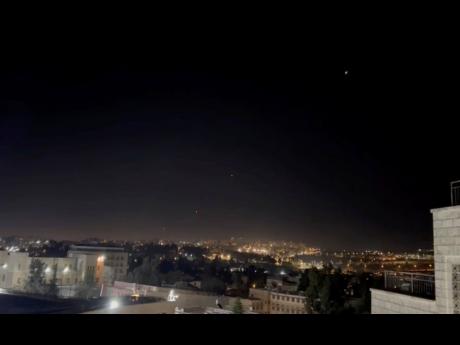‘Success’ claimed in blocking Iran’s unprecedented attack
Biden now seeks diplomatic response
TEL AVIV (AP):
Israel on Sunday hailed its air defences in the face of an unprecedented attack by Iran, saying the systems thwarted 99 per cent of the more than 300 drones and missiles launched towards its territory. Regional tensions were high amid fears of an Israeli counter-strike that could fuel further escalation.
US President Joe Biden said he would convene a meeting on Sunday of the Group of Seven advanced democracies “to coordinate a united diplomatic response to Iran’s brazen attack”. The US made clear it would not participate in any offensive action against Iran.
“We don’t seek a war with Iran. We’re not looking for escalation here,” White House National Security Spokesman John Kirby told NBC.
Iran launched the attack in response to a strike widely blamed on Israel that hit an Iranian consular building in Syria earlier this month and killed two Iranian generals. Israel said Iran launched 170 drones, more than 30 cruise missiles and more than 120 ballistic missiles.
By Sunday morning, Iran said the attack was over, and Israel reopened its airspace.
“We will build a regional coalition and collect the price from Iran, in the way and at the time that suits us,” said a key member of Israel’s War Cabinet, Benny Gantz.
SHADOW WAR
The two foes have for years been engaged in a shadow war marked by attacks such as the Damascus strike. But Sunday’s assault, which set off air-raid sirens across Israel, was the first time Iran has launched a direct military assault on Israel, despite decades of enmity dating back to the country’s 1979 Islamic Revolution.
Israel has over the years established — often with the help of the United States — a multilayered air-defence network that includes systems capable of intercepting a variety of threats, including long-range missiles, cruise missiles, drones and short-range rockets.
That system, along with collaboration with the US and others, helped thwart what could have been a far more devastating assault at a time when Israel is already bogged down in its war against Hamas in Gaza and engaged in low-level fighting on its northern border with Lebanon’s Hezbollah militia. Both Hamas and Hezbollah are backed by Iran.
Israeli and US officials praised the response to the aerial assault.
“Iran launched more than 300 threats and 99 per cent were intercepted,” said Rear Admiral Daniel Hagari, the Israeli military spokesman. “That is a success.” Asked if Israel would respond, Hagari said the country would do what was needed to protect its citizens.
Hagari said none of the drones and cruise missiles reached Israel and that only a few ballistic missiles got through. Of the cruise missiles, 25 were shot down by the Israeli air force, he said.
Hagari said minor damage was caused to an Israeli airbase, but he said it was still functioning. Rescuers said a seven-year-old girl was seriously wounded in southern Israel, apparently in a missile strike, though police were still investigating the circumstances.
Israeli Prime Minister Benjamin Netanyahu posted a message on X: “We intercepted. We blocked. Together, we will win.” Defence Minister Yoav Gallant thanked the US and other countries for their assistance.
Schools remained closed around Israel, and traffic on the first day of the workweek was lighter than usual as many people stayed home.
OPERATION OVER
General Mohammad Hossein Bagheri, the chief of staff of the Iranian armed forces, said the operation was over, the state-run IRNA news agency reported. “We have no intention of continuing the operation against Israel,” he was quoted as saying.
Iran said it targeted Israeli facilities involved in the Damascus strike.
Iran’s President Ebrahim Raisi claimed Iran had taught Israel a lesson and warned that “any new adventures against the interests of the Iranian nation would be met with a heavier and regretful response from the Islamic Republic of Iran”.
Iran’s paramilitary Revolutionary Guard issued a new threat against the US. “The terrorist US government is warned, any support or participation in harming Iran’s interests will be followed by decisive and regretting response by Iran’s armed forces,” said a statement carried by IRNA.
Hamas welcomed Iran’s attack, saying it was “a natural right and a deserved response” to the strike in Syria. It urged the Iran-backed groups in the region to continue to support Hamas in the war against Israel.
Almost immediately after the war erupted, Hezbollah began attacking Israel’s northern border. The two sides have been involved in daily exchanges of fire, while Iranian-backed groups in Iraq, Syria and Yemen have launched rockets and missiles towards Israel.

